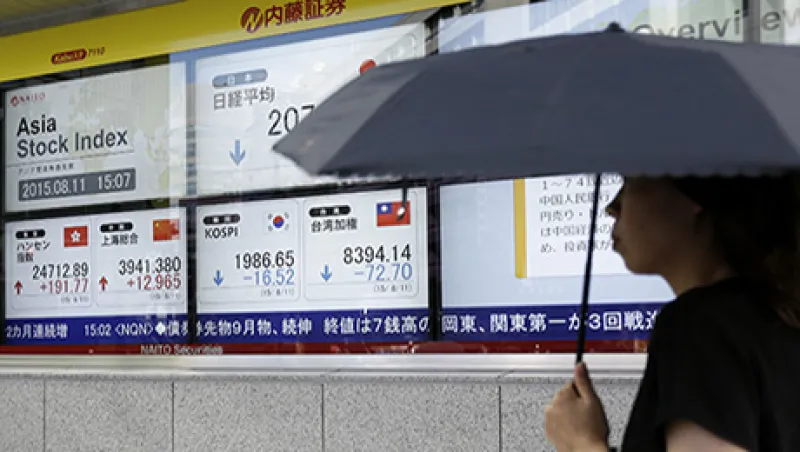Equity fund managers deal in two currencies: reality and perception. In terms of market perception, the People’s Bank of China’s devaluation of the yuan is tantamount to an earthquake. The yuan has been appreciating against the U.S. dollar for nearly 20 years. Any intimation that this policy may have outlived its usefulness and that the direction of travel may change — albeit incrementally — will make the market and its participants revise their expectations of the currency’s trajectory.
A magnified short-term market reaction to a small economic change is irrational, though not so much as it may seem at first. In our view at Investec Asset Management, markets are generally priced on the basis of implicit expectations of discounted cash flows, which are often extrapolations from the current period. Small changes in the starting point and rate of change can have a magnified effect on valuation.
The market is likely to be shaken out of its complacency on the yuan, and in fact we have already seen some reassessments in the stock market’s initial knee-jerk reaction to the devaluation. The shares of some exporters — clear beneficiaries of yuan weakness — have been marked up, whereas the shares of some resource companies have been marked down, as a weaker yuan is perceived to dampen demand. We believe the market is also likely to focus more closely on Chinese corporate foreign debt levels and the potential risks from unhedged exposures. Such divergence in company prospects may create potential for dedicated stock pickers to add value over time.
The reality is that a small change on August 11 in the valuation of the yuan will not significantly impact the fundamentals of the Chinese economy or those of the companies in which we invest. A broader and more significant devaluation of China’s currency is, of course, possible. But we believe that, at least for the short to medium term, $3.7 trillion of foreign reserves and a restrictive currency regime imply that a significant forced devaluation is unlikely. First, it is unclear that moving the currency lower would serve any practical purpose. Second, such a move would probably create a high degree of market turmoil and have some very negative consequences.
According to the International Labour Organization, China’s manufacturing wage and social benefit costs were $3.40 an hour in 2014. This rate is significantly lower than the equivalent $49.40 in Germany, $37 in the U.S. and $31.20 in Japan. Other Asian countries are more cost competitive on this front — $4.80 in Malaysia, $2.70 in Thailand, $2.10 in the Philippines and $1.70 in India — and some are gaining market share. The relative size of the first three markets, however, and the institutional and infrastructural constraints in India mean that China’s dominance across a wide range of manufacturing is unlikely to be threatened in the medium term. Devaluation will not significantly improve China’s already favorable competitiveness — thus, why would Beijing decide to make such a move?
Likewise, the fundamental impact on China’s neighbors is unlikely to be significant. China serves as both a key piece of the Asian supply chain and as a large market for its own products. Small fluctuations in exchange rates are unlikely to endanger either.
In the short term, we believe China’s fundamentals are stabilizing and improving. Macroeconomic indicators, such as property market transactions, suggest some improvement, and real interest rates in China remain high, despite four rate cuts since November 2014, and there is room for further downward moves. Finally, company valuations look attractive at a significant discount to their global peers.
Medium-term points to consider include China’s improved regulation of interbank and shadow financing and moves to address local-government funding difficulties by allowing regional administrations to borrow more transparently in bond markets, term-out their debt and clearly identify which liabilities are guaranteed. Over the longer term, attitudes are clearly changing. For example, steel capacity is being reduced, and many other oversupplied industries, such as paper, coal and cement, are also seeing gradual rationalization. State-owned enterprise reform is pressing on. China’s high-speed locomotive manufacturers merged earlier this year; shipping companies are widely believed to be next.
Over the past two decades, China has had the strongest currency in emerging markets, bar none. It has had the strongest major economy in emerging markets, bar none. It has also had the worst-performing major stock market in emerging markets, bar none. A passive, index-tracking investor would have lost money over the past 20 years. Yet slower economic growth and a moderately weaker currency over time may not be a bad thing, given that the reverse has not worked. In our view, those looking to invest in a handful of China’s best companies may be optimistic that continuing rapid change in China plays to the strengths of stock pickers willing to find them.
Archie Hart is a portfolio manager in the emerging-markets equity strategy at Investec Asset Management in London.
Get more on emerging markets and on foreign exchange.






